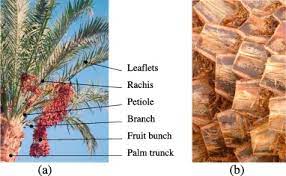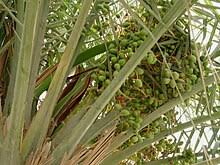Dates petioles is the slender, stalk-like structure that connects a leaf to the stem of a dates plant. This structure plays a crucial role in the overall growth and function of a leaf. Petioles are typically thin, elongated, and cylindrical in shape. They vary in length depending on the plant species and the specific leaf they support. The color of the petiole can also vary, ranging from green to reddish or brown, depending on the plant and its age.
The petiole attaches to the leaf blade at one end and to the stem or branch of the plant at the other end. It serves as the bridge between the leaf and the rest of the plant. The primary function of a petiole is to support the leaf and position it for optimal exposure to sunlight. By connecting the leaf to the stem, it allows the leaf to capture sunlight for photosynthesis, which is crucial for the plant’s energy production.
Petioles also play a role in transporting water, nutrients, and sugars between the leaf and the rest of the plant. They contain vascular tissues, including xylem and phloem, which facilitate the movement of these substances. Petioles can vary in length, thickness, and shape among different plant species. Some petioles are very short and barely noticeable, while others are longer and more prominent. Some may have specialized adaptations, such as thorns or glands.
The arrangement of petioles on a plant’s stem can be alternate, opposite, or whorled, depending on the species. This arrangement is a key characteristic used in plant taxonomy and identification.
Dates Petioles are essential structures in plants, as they provide mechanical support, enable efficient photosynthesis, and facilitate the transport of vital substances throughout the plant. They are a fundamental part of the plant’s anatomy and contribute to its overall health and growth.
The Economic Importance and Uses of Dates Petioles

Dates petioles, often referred to as date palm fronds or date palm leaf stalks, have several economic importance and uses in various industries and traditional practices.
Here are some of the key uses and economic importance of date palm petioles:
1. Basketry: Dates petioles are commonly used to create traditional baskets, mats, and other woven products. These crafts have both cultural and economic significance, as they are often sold in local markets or to tourists.
2. Roof Thatching: The long and sturdy nature of date palm petioles makes them suitable for thatching roofs. They provide natural insulation and are a cost-effective roofing material in many regions.
3. Firewood and Charcoal: Dates petioles are used as a source of fuel in many areas. They can be burned as firewood or converted into charcoal, providing a sustainable energy source in regions where other fuels may be scarce.
4. Animal Fodder: The petioles can be used as animal fodder, providing a source of nutrition for livestock. They are often fed to camels, goats, and other animals in arid regions.
5. Mulch: Ground-up dates petioles can be used as mulch in gardens and agricultural fields. They help retain moisture in the soil, suppress weeds, and improve soil quality.
Read Also: Dates Inflorescence: Economic Importance, Uses and By-Products
6. Herbal Remedies: In some traditional medicine systems, extracts from date palm petioles are used for various medicinal purposes. They are believed to have properties that can treat ailments like diabetes and rheumatism, although scientific evidence supporting these claims is limited.
7. Employment: Harvesting, processing, and crafting with date palm petioles provide employment opportunities for many communities in date-growing regions, contributing to their economic well-being.
8. Rituals and Ceremonies: Dates petioles are often used in cultural and religious ceremonies, such as weddings and festivals. They hold symbolic value and are an integral part of many traditional rituals.
9. Soil Erosion Control: Planting date palms, which produce petioles, can help control soil erosion in arid and desert regions. The root systems of date palms help stabilize the soil.
10. Cooking Utensils: In some cultures, date petioles are used to make cooking utensils like spatulas and serving spoons. They are durable and resistant to heat.
11. Artistic Uses: Date palm petioles are sometimes used in artistic and decorative crafts. They can be carved or painted to create unique pieces of art and home decor.
12. Biomass Energy: Date palm petioles can be processed to produce biofuels like ethanol or biogas, contributing to renewable energy sources and reducing waste.
The Products and By-products That Can Be Derived From Dates Petioles
Dates petioles, also known as date palm petioles or date palm leaf stalks, are versatile plant parts that can be used to create various products and by-products.
Here is a list of some of the products and by-products that can be derived from dates petioles:
1. Date Palm Fiber: The primary product obtained from date palm petioles is date palm fiber. This fiber can be extracted from the petioles and used in various industries, including textile manufacturing, as it is strong, durable, and resistant to moisture.
2. Crafts and Artifacts: Date palm petioles can be used to create a variety of crafts and artifacts, including baskets, mats, and decorative items. The flexibility of the petioles makes them suitable for weaving and shaping into different forms.
3. Furniture: Date palm petioles can be used to make furniture such as chairs, tables, and shelves. They are often employed in traditional furniture-making in regions where date palms are abundant.
Read Also: Currants Pulp: Economic Importance, Uses and By-Products
4. Biofuels: Date palm petioles can be converted into biofuels through processes like pyrolysis or fermentation. The cellulose and lignin in the petioles can be broken down to produce bioethanol or biogas.
5. Animal Feed: After processing, date palm petioles can be used as a source of livestock feed. They are particularly valuable for ruminant animals like goats and camels due to their nutritional content.
6. Compost: Date palm petioles can be composted to create organic fertilizer. They add carbon to the compost pile and break down over time, enriching the soil with nutrients.
7. Mulch: Chopped or shredded date palm petioles can be used as mulch in gardens and agricultural fields. They help retain soil moisture, suppress weeds, and regulate soil temperature.
8. Paper and Cardboard: The cellulose content in date palm petioles can be used to produce paper and cardboard. This can be especially important in regions where other sources of papermaking materials are scarce.
9. Biochemicals and Pharmaceuticals: Date palm petioles contain compounds that can be extracted for use in the production of biochemicals or pharmaceuticals. These compounds may have potential health benefits.
10. Handicrafts: Besides functional items like baskets and mats, date palm petioles can be used in the creation of decorative handicrafts, adding an aesthetic value to their utilization.
11. Erosion Control: In some areas, date palm petioles can be used in erosion control measures. They can be placed along riverbanks or slopes to prevent soil erosion.
12. Biochar: Date palm petioles can be converted into biochar through pyrolysis. Biochar is a stable form of carbon that can improve soil quality and sequester carbon dioxide.
13. Biomass Energy: Date palm petioles can be used as a source of biomass energy. They can be burned to generate heat and electricity, particularly in regions with limited access to conventional energy sources.
14. Animal Bedding: Chopped or shredded date palm petioles can be used as bedding material for animals in agricultural settings. They provide comfort and insulation.
15. Construction Material: In some regions, date palm petioles are used as a construction material, especially for temporary structures like fences, huts, and scaffolding.
16. Medicinal Uses: Some traditional medicinal practices use extracts or preparations from date palm petioles for various health remedies. However, scientific validation is needed for these claims.
In conclusion, date palm petioles have a wide range of economic uses and cultural significance in regions where date palm cultivation is prevalent. They provide livelihoods, materials for construction and crafts, and have various environmental and agricultural benefits. However, the extent of their economic importance can vary depending on the local context and the availability of alternative resources.
Read Also: What You Should Know Before Buying a Farm

